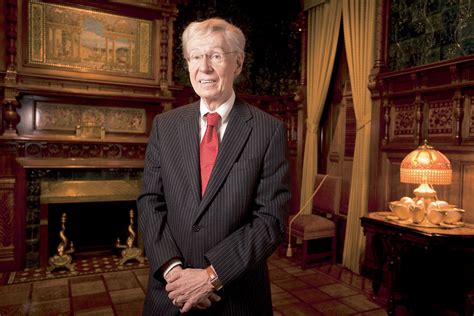A Quote by Havelock Ellis
Philosophy is a purely personal matter. A genuine philosopher's credo is the outcome of a single complex personality; it cannot be transferred. No two persons, if sincere, can have the same philosophy.
Related Quotes
From what deep springs of character our personal philosophies issue, we cannot be sure. In philosophers themselves we seem always able to notice some deep internal correspondence between the man and his philosophy. Are our philosophies, then, merely the inevitable outcome of the body of fate and personal circumstance that is thrust upon each of us? Or are these beliefs the means by which we freely create ourselves as the persons we become? Here, at the very outset, the question of freedom already hovers in the background.
You must fully understand, strongly believe in, and be totally committed to your trading philosophy. In order to achieve that mental state, you have to do a great deal of independent research. A trading philosophy is something that cannot just be transferred from one person to another; it's something that you have to acquire yourself through time and effort.
BERTRAND RUSSELL, The Philosophy of Logical Atomism We've associated that word philosophy with academic study that in its own way has gotten so far beyond the layman that if you read contemporary philosophy you've no clue, because it's almost become math. And it's odd that if you don't do that and you call yourself a philosopher that you always get 'homespun' attached to it.
I intend Deaths in Venice to contribute both to literary criticism and to philosophy. But it's not "strict philosophy" in the sense of arguing for specific theses. As I remark, there's a style of philosophy - present in writers from Plato to Rawls - that invites readers to consider a certain class of phenomena in a new way. In the book, I associate this, in particular, with my good friend, the eminent philosopher of science, Nancy Cartwright, who practices it extremely skilfully.
Philosophy - reduced, as we have seen, to philosophical discourse - develops from this point on in a different atmosphere and environment from that of ancient philosophy. In modern university philosophy, philosophy is obviously no longer a way of life, or a form of life - unless it be the form of life of a professor of philosophy.
Experience has repeatedly confirmed that well-known maxim of Bacon's that 'a little philosophy inclineth a man's mind to atheism, but depth in philosophy bringeth men's minds about to religion.' At the same time, when Bacon penned that sage epigram... he forgot to add that the God to whom depth in philosophy brings back men's minds is far from being the same from whom a little philosophy estranges them.
I would say to anybody who thinks that all the problems in philosophy can be translated into empirically verifiable answers - whether it be a Lawrence Krauss thinking that physics is rendering philosophy obsolete or a Sam Harris thinking that neuroscience is rendering moral philosophy obsolete - that it takes an awful lot of philosophy - philosophy of science in the first case, moral philosophy in the second - even to demonstrate the relevance of these empirical sciences.
Philosophy is antipoetic. Philosophize about mankind and you brush aside individual uniqueness, which a poet cannot do without self-damage. Unless, for a start, he has a strong personal rhythm to vary his metrics, he is nothing. Poets mistrust philosophy. They know that once the heads are counted, each owner of a head loses his personal identify and becomes a number in some government scheme: if not as a slave or serf, at least as a party to the device of majority voting, which smothers personal views.
I drifted into a career in academic philosophy because I couldn't see anything outside the academy that looked to be anything other than drudgery. But I wouldn't say I 'became a philosopher' until an early mid-life crisis forced me to confront the fact that, while 'philosophy' means 'love of wisdom', and 'wisdom' is the knowledge of how to live well, the analytic philosophy in which I had been trained seemed to have nothing to do with life.
In many ways, the effort to study philosophy was my rebellion away from medicine. I'm the son of two Indian immigrant physicians, so the natural path for me would have been to become a doctor. I ended up doing the master's degree at Oxford in politics, philosophy, and economics while already having a seat in medical school. I was keeping that as my escape hatch. But my hope was that I might become a philosopher or something else entirely.
A writer must always try to have a philosophy and he should also have a psychology and a philology and many other things. Without a philosophy and a psychology and all these various other things he is not really worthy of being called a writer. I agree with Kant and Schopenhauer and Plato and Spinoza and that is quite enough to be called a philosophy. But then of course a philosophy is not the same thing as a style.






































